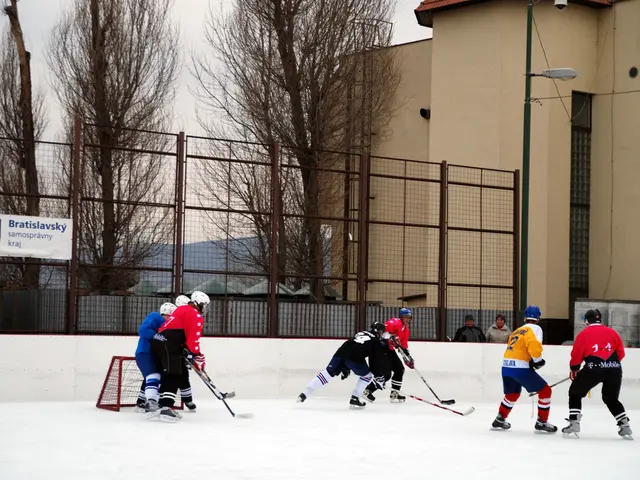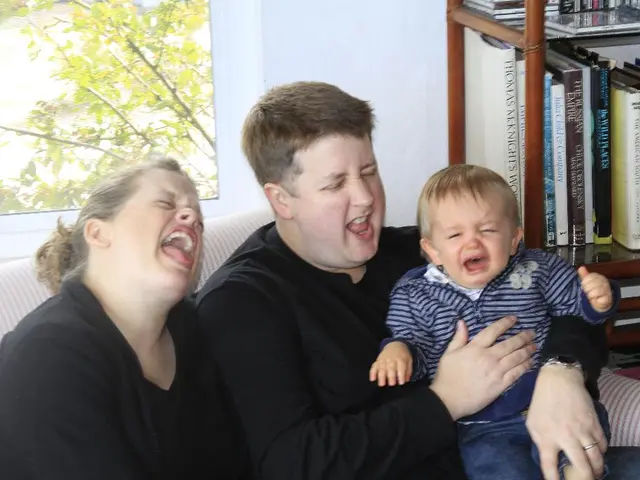Who's Inching Towards Another World War? Surprisingly Many, Says New Study
- by Patrick Rösing
- 6 Min
A significant number of individuals expect or predict the occurrence of another global conflict, as indicated by the survey findings. - Majority of Individuals Believe World War III is Likely to Occur
On May 8, 1945, Europe bid farewell to the awful grip of World War II. It's been eight decades since, and the date remains a cherished symbol of liberation from fascism. To commemorate the occasion, YouGov conducted a poll to gauge global perceptions on the war, potential future conflicts, and the looming specter of a Third World War.
The survey's exclusive findings were shared with stern beforehand.
Pressing Concerns About a Third World War
Across five European countries and the USA, a substantial portion of respondents considers the prospect of a Third World War within the next half-decade probable or highly likely. The most apprehensive cohort resides in France, with a total of 55 percent expressing their worries. In contrast, less than half of Germans share this sentiment.
When probed about the recognized threats to European peace, respondents often cited escalating tensions with Russia (an average of 78 percent) and Islamic terrorism (72 percent) as significant concerns. Among Germans, 55 percent also expressed alarm at potential rifts between the USA and themselves as risk factors for peace.
Should armed conflict break out, many Germans express a lack of faith in their country's defense readiness. Most believe that the Bundeswehr would be insufficient to defend the nation in a hostile clash. The SPD party faithful, who elected Boris Pistorius as defense minister, constitute the most hopeful faction, while the least trust is found among AfD and BSW supporters.
Interestingly, a majority of respondents (57 percent on average) stated that their respective countries should come to the aid of a fellow NATO member under attack. Germany leads the pack after the UK in this regard.
YouGov also questioned participants on whether they believed crimes akin to those committed by the Nazis could hypothetically resurface in their lifetime. Most Europeans believe that such a horror will not reoccur in Germany. Germans, however, exhibit more hesitation. The perceived risk of similar ordeals in the USA or another Western European nation is generally assessed to be higher.
Reflections on World War II and Its Aftermath
When asked to evaluate their country's role in World War II, accommodating views varied significantly. In the USA, UK, and France, partisanship overwhelmingly endorsed their nations' roles as Allies. In contrast, disapproval outweighed approval in the former Axis powers, Germany and Italy. Nevertheless, only 70 percent of Germans deemed their country's participation as unfavorable.
Opinions on which nation played the most significant role in defeating Nazi Germany were divided as well. Majorities across countries attributed the prominence to the USA, with the exception of Britons, who credited their own country as the prime mover.
The war in Europe officially concluded with the Third Reich's capitulation on May 8, 1945. However, the conflict raged on in the Pacific until September 2, 1945, bringing about Japan's surrender. Two devastating atomic bombings, on Hiroshima and Nagasaki, hastened the country's surrender, making them the sole instances of nuclear weapons being used in warfare to date. A substantial majority (63 percent) felt that these actions were morally unjustified, while a more moderate 18 percent upheld their justification. Support was highest in the USA and lowest in Germany.
Surprisingly, 75 percent of respondents concurred that nuclear weapons would be employed in a Third World War.
Additional Insights:
- Peacekeeper Champions in Germany: Germans generally acknowledged NATO as the continent's prime peacekeeper after World War II, with 38 percent declaring NATO's contribution as 'very much' to pacifying Europe. Around a quarter attributed a similar role to the European Union, which received the Nobel Peace Prize in 2012. AfD supporters, on the other hand, ascribed a diminished role to the EU, while Green supporters valued it on par with NATO.
- Knowledge of World War II in Germany: While 80 years have passed since its end, the majority of Germans still demonstrated comprehension of the war and its context, with men claiming to have a grasp on more than women. When asked about the importance of teaching World War II in schools, 82 percent agreed that it should be part of the curriculum. However, this figure dropped significantly among AfD supporters, with 26 percent considering it not very or not at all important.
*Methodology: YouGov conducted surveys among the adult resident population of countries surveyed in April 2025. In Germany, 2,318 people were surveyed from April 4 to 7. In the UK, 1,622 people were surveyed on April 3 and 4. In France, 1,081 people were surveyed between April 4 and 14, in Italy 1,023 people between April 4 and 16, and in Spain 1,051 people between April 4 and 10. In the U.S., 1,152 people were surveyed between April 10 and 14.**
- In the poll conducted by YouGov, a substantial number of respondents across five European countries and the USA believe that a Third World War within the next half-decade is probable or highly likely, with the most apprehensive cohort being in France (55%).
- When asked about recognized threats to European peace, respondents often cited escalating tensions with Russia (an average of 78%) and Islamic terrorism (72%) as significant concerns.
- In Germany, most believe that their country's defense readiness is insufficient to defend the nation in a hostile clash, with the SPD party faithful being the most hopeful faction and the least trust being found among AfD and BSW supporters.
- Interestingly, a majority of respondents (57% on average) stated that their respective countries should come to the aid of a fellow NATO member under attack, with Germany leading the pack after the UK in this regard.










